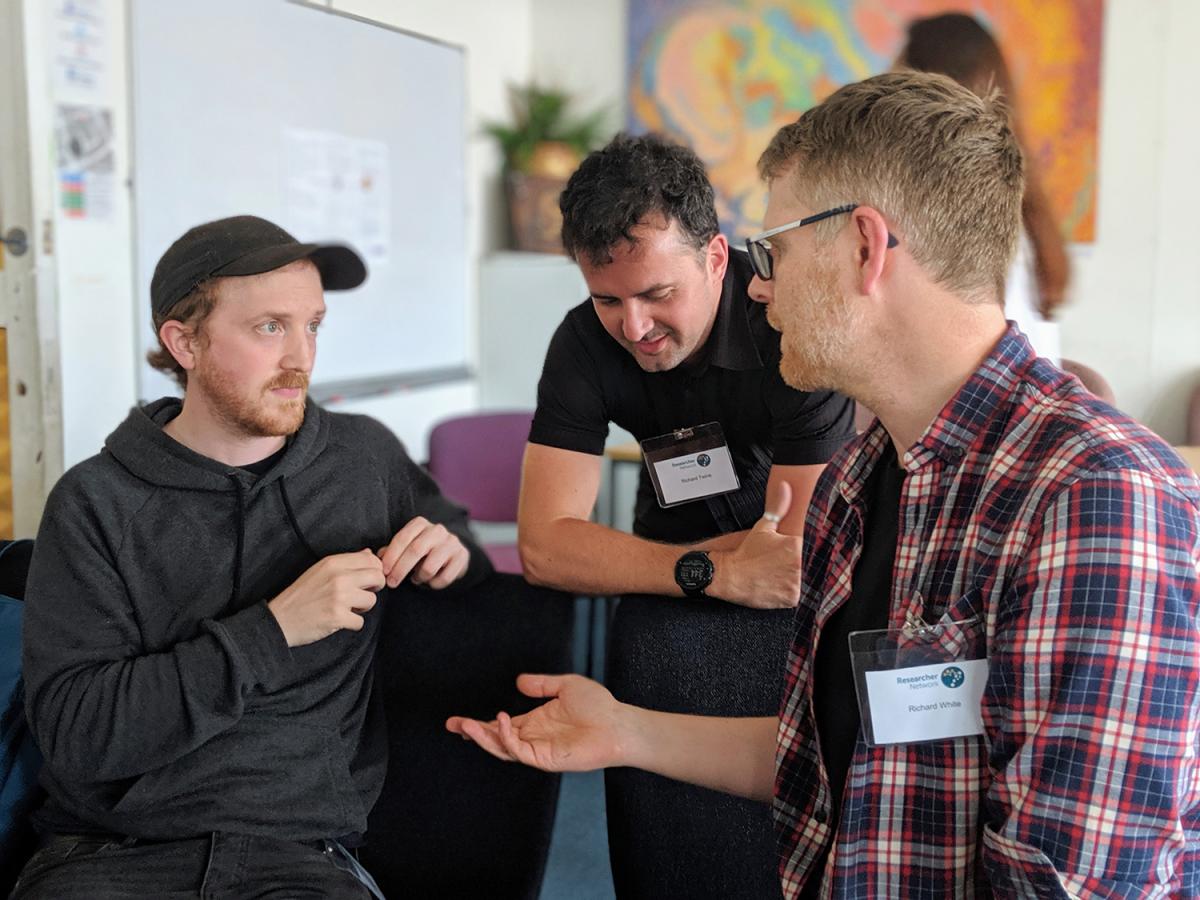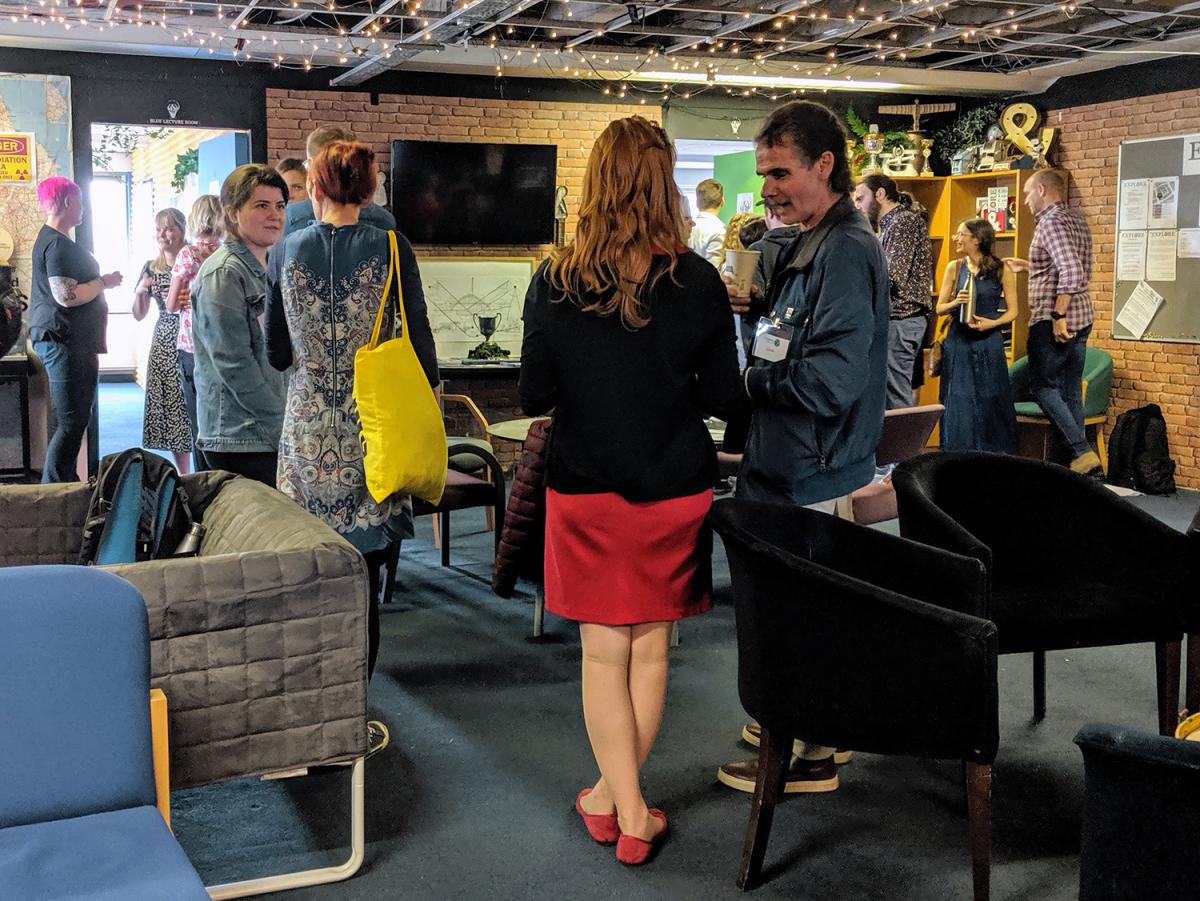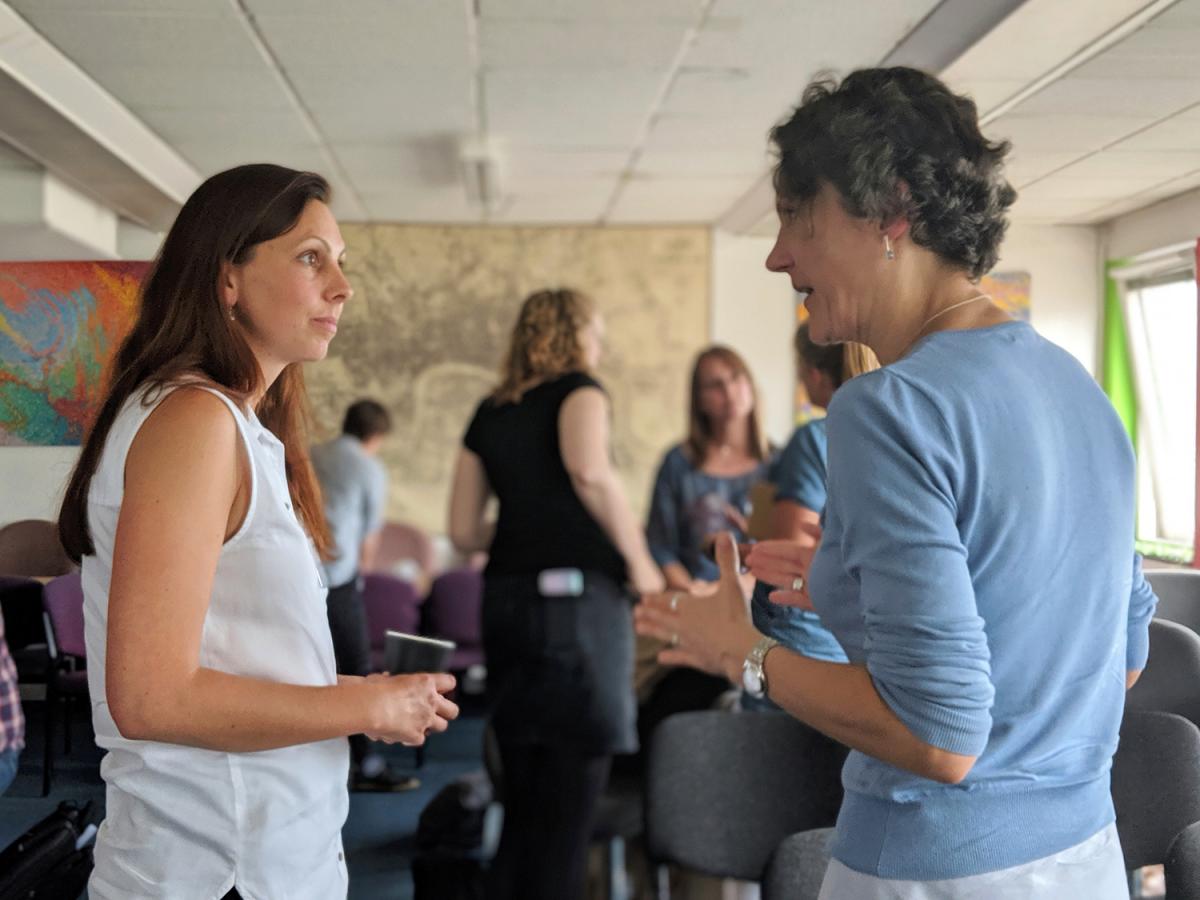In this special edition of Research News, Researcher Network member, John Andrews, reviews The Vegan Society's first ever Research Day, which took place on July 31st this year in Newcastle-upon-Tyne.
Introduction
Anyone who has tried to do research into vegans, veganism or related topics will know what a broad church vegan academia is. There are significant pockets of work that bring together work related to veganism - most notably Critical Animal Studies, and more recently Vegan Studies - but by and large the work of vegans and the study of veganism as a phenomenon is dispersed throughout the literature, with no single disciplinary home. On the one hand, that could imply overlaps and underlaps in research, but on the other it points to a remarkable breadth of perspectives from which we can learn. To that end, in July The Vegan Society brought together dozens of academics and researchers from across the disciplinary spectrum to discuss their work, share ideas, and stimulate collaboration, in the first face to face meeting of the Researcher Network.
As part of its day-to-day work, The Vegan Society engages in a wide range of research, and also invites research from others to support its efforts. Through its Research Advisory Committee, and its growing Researcher Network, the Society gets involved in work both to help its advocacy, but also to help vegans navigate the (not-yet-vegan) world, through its three research themes of health and wellbeing, society and culture, and the environment and sustainability. An explicitly interdisciplinary and mixed methods approach to research means that the sort of work the Society gets involved in and welcomes from its affiliated researchers is eclectic - as was clearly in evidence from the research day.
So what happens when you get several dozen academics and researchers together in a room on the subject of veganism?

For one thing, you generate an incredibly varied set of discussions, on everything from car manufacturing management technologies through to a discussion of Lady Gaga’s ‘meat dress’, via criminology, political philosophy, nutritional science, and more. Speakers ranged across themes from dietary change through to how to voice non-humans in literature; from how vegans can make sure to get enough omega-3 in their diets through to coping strategies for vegans living in a non-vegan world. The sheer eclecticism of the work reinforced the sense that veganism is not just about ‘eating this’ or ‘wearing that’, but is about who we are, how we relate to the world, and how we might look to change that world. The day’s presentations also spoke to the diversity of challenges that we face, as individuals trying to get by day-to-day, and as active citizens who are pushing for change.
The structure of the day saw presentations that spoke to all three of The Vegan Society’s research themes. On health and wellbeing, we heard about the role and importance of omega-3 fatty acids. On society and culture, we delved into cultural theory and the construction of vegan identities. On the environment we heard from researchers looking at factors influencing agricultural transitions. But across the dozen or so presentations, I also picked out a number of other themes, around which I have shaped the rest of this summary. In short, these themes are (1) rethinking the language we use; (2) viewing familiar disciplines through a vegan lens; (3) understanding behaviour and behaviour change; and (4) navigating the world as vegans.
Summary of the day’s presentations

Several of the speakers focused on the importance of language for how we see the world, and I took from them a request to think about and use language differently.
Natalie Joelle’s paper on ‘gleaning lean culture’ asked us to be critical of seemingly ubiquitous discourses of ‘lean’ management. Discourses and practices of ‘lean’ often come with pretences of ‘green’ credentials, but inescapably have their origins in the slaughterhouses of Chicago (from where they were picked up by the automotive industry), and struggle to escape from associations with ‘lean meat’. For Natalie, visions of an ecological utopia governed by ‘lean’ processes fail to transcend the origins of lean or acknowledge the role of ‘lean’ in the ongoing intensification of meat and dairy production. After Natalie’s presentation, Dr Alex Lockwood led participants in a creative writing exercise aimed at giving voice to non-human animals. We produced short passages about a particular non-human animal of our choice, but were then challenged to re-write from the animal’s point of view, forcing us to think about the importance we attach to names, to particular nouns and verbs, and consider the ways in which these attachments colour our perception of the world, and how this might differ if we try to ‘voice’ non-humans.
Another set of speakers asked us to think about familiar schools of thought or ideas in new (vegan) ways.
For Dr Melanie Flynn’s presentation this was criminology, and in particular green criminology. Green criminology originated in the 1990s as a way of thinking about environmental harms more broadly than conventional approaches that focus on ‘officially defined’ victims of crime. But Dr Flynn noted that green criminology and associated approaches to victimology nevertheless exclude the interests of non-human animals, despite the clear evidence that those animals are routinely harmed directly and indirectly in large numbers. She made the case for an expanded green criminology with space for non-human animals as victims. Dr Josh Milburn invited us to consider the possibilities of vegan perspectives for political philosophy. Many of us will be familiar with the extensive literature on moral philosophy in relation to animal ethics, but Dr Milburn asked us to consider the growing trend for philosophers to think in political terms, investigating political categories such as citizenship, political schools of thought such as liberalism or libertarianism, and even subjects such as labour rights in relation to non-human animals. He raised the question of what a vegan state would look like, and the range of political and philosophical issues that such a question might then also throw up - a subject with which his ongoing work will deal.
A third group of talks can be categorised as asking how we can better understand non-vegans, and how to persuade people to alter their behaviour, with one group speaking largely to issues of consumption, and another to issues of production.
On the consumption side, Dr Niki Rust presented her work on sustainable diets which explores the range of possible interventions that could encourage people towards more plant-based diets, from minimally interventionist approaches such as providing consumers with better information, to more actively interventionist measures such as the restriction of consumer choice. Dr Rust highlighted gaps in the sustainable diets literature in terms of how to effect practical change but, as she pointed out, perhaps one of the biggest gaps is unfortunately in terms of political will and leadership to forge on with what we already know. Also on the subject of consumption patterns, Dr Beth Clark explored the gap between people’s professed attitudes towards animal welfare and their actual consumption behaviour. Dr Clarke’s survey work on attitudes towards intensive production methods across several European countries suggested that people may not feel responsible for issues of welfare, and that other factors such as price, the availability of alternatives, and the clarity (of lack thereof) of labelling, may also act as barriers. Dr Clarke’s work also suggested that many people remain completely disconnected from production, and in many cases simply do not know where their food is coming from. Ruth Buckley-Salmon also outlined some forthcoming survey work intended to generate insights as to how various policy interventions are perceived by the general population and which would be most broadly accepted, arguing that much of the sustainable diets literature has (somewhat surprisingly) failed to ask this basic question. Sticking with the theme of understanding consumers, Lynda Korimboccus also gave an overview of forthcoming work, in which she is looking to further our understanding of the well-known meat paradox (in which people profess to care for the wellbeing of animals, yet continue to eat meat) by exploring species-specific examples, most notably what she called the ‘Peppa Pig Paradox’, whereby ham sandwiches were made available to children at a Peppa Pig-themed show.
The second set of speakers I’ve grouped under this theme spoke to agricultural production issues, in terms of how we can better understand farmers and the communities of which they are part.
Emily Holmes looked at the possibilities for agricultural transformation towards greater production of plant-based proteins post-Brexit, with an investigation into farmers’ attitudes towards farm transitions and the factors that shape their decisions. Emily’s research highlighted the complex nature of farmers’ decisions, which are based on combinations of factors relating to governmental policy, their perceptions of economic and market opportunities, and issues of personal identity and circumstance, including basic factors such as proximity to retirement, which emerged as an important influencer of willingness to invest for long-term change. Ekaterina Gladkova also presented research relating to agricultural production, this time in relation to increasingly intensive pig meat production in Northern Ireland, where the number of pigs is up, the number of farms is down, and the environmental impacts of intensive production are increasingly noticeable. Yet Ekaterina’s work highlighted the fact that concerns in the local community around intensive production were rarely (if ever) accompanied by commitments to veganism, with local campaigners instead tending to favour small-scale organic farming as an alternative. Her research further evidenced some of the ways in which farming is an issue of culture and identity, where people’s perceptions of the place of animal agriculture in the local landscape may hold significant sway for the types of change they think are desirable.
Lastly, a group of presentations spoke to how vegans should navigate the world and their identities.
On the one hand, this can be a highly practical question of what we should eat, as illustrated by the nutritional science presented by Elena Holmes on the subject of omega-3 fatty acids, which are generally recognised as important for brain health, eye functioning, and the prevention of various diseases. Her talk took us through the plant-based sources of omega-3: She sang the praises of vegan staples such as linseed, walnuts and chia seeds, but also suggested that if in doubt, or in the context of certain demographic groups, supplementation can also be recommended. Away from prosaic questions of diet were a number of talks that spoke to vegan culture and identity. Dr Eva Haifa Giraud took us into cultural theory and ideas of how vegan identities are constructed and construed in a world where veganism is increasingly moving out of the margins and into the mainstream, bringing with it all manner of debates around ‘purity politics’ and ‘lifestyle veganism’, some of which appear to depoliticise veganism and shift it away from more radical traditions of activism. On the one hand, being open to a diversity of (food) practices may appear to open up the space in which people can be vegan, but Dr Giraud also noted that there is a point at which pluralisms cease to be commensurable within political movements: activist groups pursuing ethically-motivated political change may struggle to embrace elements that are too far removed from their core aims, just as pacifism would be ‘cancelled out’ by an attempt to incorporate non-pacifist elements. For Dr Giraud this implies the need for a bottom-up rethinking of veganism and vegan identity. Sticking with the theme of navigating vegan identity, the final speaker of the day, Emelia Quinn, invited us to consider the possibilities for using camp aesthetics (characterised in Susan Sontag’s terms as a love of artifice, stylisation and extravagance) as a coping strategy for vegans living in a non-vegan world, as part of an effort to step outside the otherwise “relentless confrontation” of the horrors of non-human animal suffering. Using a particularly kitsch piece of scrimshaw - a whale tooth with an image of British colonial conquest carved into it - to illustrate her point, she asked how vegans should respond to such objects: with earnestness, or by appropriation and lampooning of their near absurdity? In using parody to re-cast such objects, Emelia invited us to consider the possibility of a (perhaps aspirational) world in which animal products have less power over us, helping us move away from a sense of sheer despair at the non-vegan world.

In closing, Dr Lorna Brocksopp, The Vegan Society’s Research Officer, pointed to a variety of things to which we can look forward.
This includes a continuation of the excellent Grow Green campaign as well as follow-up research to the Pathways to Veganism project (the results of both of which are available through The Vegan Society’s website and make for highly recommended reading). Finally, Dr Brocksopp gave an indication of further work to come on the subjects of veganism and mental health, and understanding compassionate behaviour. All in all, as I hope is clear from the above, the day gave plenty of food for thought. As it happened, it also gave me plenty of great vegan food to eat, with Newcastle’s vegan restaurants providing some excellent fare for lunch and dinner. I’m left looking forward to the next time The Vegan Society convenes its Researcher Network, and hoping the spirit of collaboration and sharing ideas continues.
John Andrews, The Vegan Society Researcher Network.
Notes:
Many thanks to RAC member, Dr Alex Lockwood, for donating the use of the event space. The Research Day was held in a wonderfully vibrant and creative space at Ampersand Inventions in Newcastle-upon-Tyne.
We've received some brillianty feedback from Research Day delegates - here's a teeny snapshot of their comments:
"I work within the vegan/animal advocacy movement and found gaining insights into current research being carried out to be really informative and helpful. Thank you for opening it up to those outside of academia!"
"An excellent day. Thank you for hosting it!"
"Excellent presentations, a good range of topics, and very high standards of the research presented. I was delighted and honoured to be a part of the event. Thank you!"
"I particularly liked the interdisciplinary nature of the event and the mix of presentations between early career and established researchers."
"Lorna did an excellent job coordinating the day and establishing the overall framing. The venue was fantastic too. The information provided was clear and succinct, including a list of nearby places to eat was great and ensured costs/food waste was kept down."
"Lots of wonderful people and interesting work going on!"
"Great combination of presentations, engaging discussions and very friendly environment!"
Interested in being involved in our next Research Day? Do drop us a line here and tell us how - we'd love you to get involved!
The views expressed by our Research News contributors are not necessarily the views of The Vegan Society.
The views expressed by our Research News contributors are not necessarily the views of The Vegan Society.


